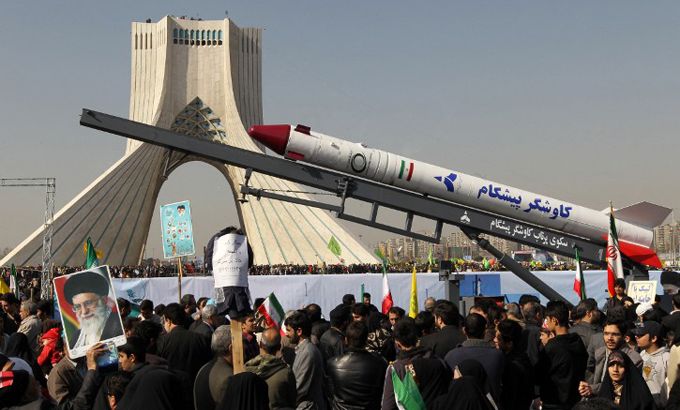Defiant Iran marks 1979 revolution
Iran’s President Mahmoud Ahmadinejad says Tehran will not negotiate its disputed nuclear programme under pressure.

Hundreds of thousands of people have marched through the Iranian capital and other cities chanting “Death to America” as Iran marked the 34th anniversary of the Islamic revolution that toppled the US-backed Shah.
In Tehran, crowds waving Iranian flags and portraits of revolutionary leader Ayatollah Ruhollah Khomeini walked towards the landmark Azadi [Freedom] Square, in a government-sponsored rally on Sunday.
Marchers also chanted “Death to Israel” as they headed for the square, some waving posters of supreme leader Ayatollah Ali Khamenei.
President Mahmoud Ahmadinejad told the crowds in the square that Iran was now a “nuclear state” and added that Western countries were hampering genuine reform in the country.
“Iran has become nuclear, and so Iran’s enemies are unhappy,” he told cheering crowds.
Iran also held similar rallies nationwide, especially in large provincial capitals such as Mashhad, Isfahan, Shiraz and Kerman.
At the Tehran rally, foreign media were being closely monitored and allowed to cover the event from officially designated areas only.
The rally marks February 11 when the army declared solidarity with the people, turning its back on Shah Mohammad Reza Pahlavi. Ten days beforehand, Khomeini returned in triumph from exile in France to lead the revolutionaries to power.
Tehran is currently under a series of international sanctions aimed at curbing its controversial nuclear programme of uranium enrichment.
World powers and Iran’s arch regional foe Israel suspect that Tehran is trying to develop atomic weapons under the cover of its civilian programme, a charge repeatedly and vehemently denied by the Islamic republic.
The sanctions have led to a severe economic crisis, hindering Iran’s banking system and limiting its oil exports, the country’s main foreign revenue earner.
According to a recent survey by the US polling firm Gallup, Iran’s nuclear programme is supported by a large majority of its population.
Internal conflict
The national celebrations are taking place a week after Ahmadinejad and his political rival, parliamentary speaker Ali Larijani, traded public accusations of corruption, an outbreak of infighting that is expected to grow more vicious as the country approaches presidential elections slated for June.
The parliament is dominated by a faction loyal to Khamenei and hostile to Ahmadinejad, who cannot stand for reelection.
Khamenei, Iran’s unelected leader, has struggled to suppress rows among officials which have broken out into the open despite warning that such public spats were a betrayal of the country.
The last presidential election in 2009 set off mass protests at Ahmadinejad’s victory, which opponents called fraudulent. Ahmadinejad is believed to have since lost Khamenei’s backing.
In January, Khamenei’s representative to the powerful Islamic Revolutionary Guard Corps, Ali Saeedi, said it was part of the role of the Guards to “engineer” the elections.
Ahmadinejad, who is believed to want to maintain influence after stepping down, possibly by backing an ally as a candidate, appeared to warn against such efforts on Sunday.